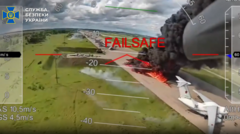On June 1, Ukraine executed an unprecedented aerial assault dubbed "Spider Web," deploying over 100 drones against Russian airbases located deep within enemy territory. This meticulously planned operation was 18 months in the making and showcased a significant advancement in Ukraine's tactical capabilities.
Ukrainian "Spider Web" Drone Offensive: A Strategic Blow to Russian Air Power

Ukrainian "Spider Web" Drone Offensive: A Strategic Blow to Russian Air Power
Ukraine launches a groundbreaking drone strike operation, targeting key Russian military airbases with remarkable precision.
The operation's scope became evident as explosions rang out in five different Russian regions, including Murmansk and Irkutsk, and highlighted Ukraine's strategy against nuclear-capable bombers. The Ukrainian President Volodymyr Zelensky confirmed the use of 117 drones and noted that preparations for the operation took over a year and a half. The drones, ingeniously concealed in wooden cabins atop unsuspecting lorries, were launched remotely against their targets. Videos online depict the tactical ingenuity of the operation, including lorry drivers unwittingly assisting the Ukrainian offensive.
According to Russian sources, the damage was reported primarily in Murmansk and Irkutsk, albeit Ukraine claims significant aircraft losses, including the destruction of at least 13 strategic bombers. Ukrainian intelligence revealed that the A-50 military spy planes were also targeted, representing a heavy blow to Russia's aerial surveillance capabilities. Russia's silence in response to the attacks, despite severe operational impacts, suggests an ongoing concern regarding the drone strategy's effectiveness.
Highlighted as a major triumph for Ukraine, this operation could have far-reaching implications for the dynamics of the ongoing conflict, raising questions about the future of aerial warfare and military logistics.
As the world watches, Zelensky’s message reflects a determined resolve: "These actions will undoubtedly be in history books."
According to Russian sources, the damage was reported primarily in Murmansk and Irkutsk, albeit Ukraine claims significant aircraft losses, including the destruction of at least 13 strategic bombers. Ukrainian intelligence revealed that the A-50 military spy planes were also targeted, representing a heavy blow to Russia's aerial surveillance capabilities. Russia's silence in response to the attacks, despite severe operational impacts, suggests an ongoing concern regarding the drone strategy's effectiveness.
Highlighted as a major triumph for Ukraine, this operation could have far-reaching implications for the dynamics of the ongoing conflict, raising questions about the future of aerial warfare and military logistics.
As the world watches, Zelensky’s message reflects a determined resolve: "These actions will undoubtedly be in history books."






















